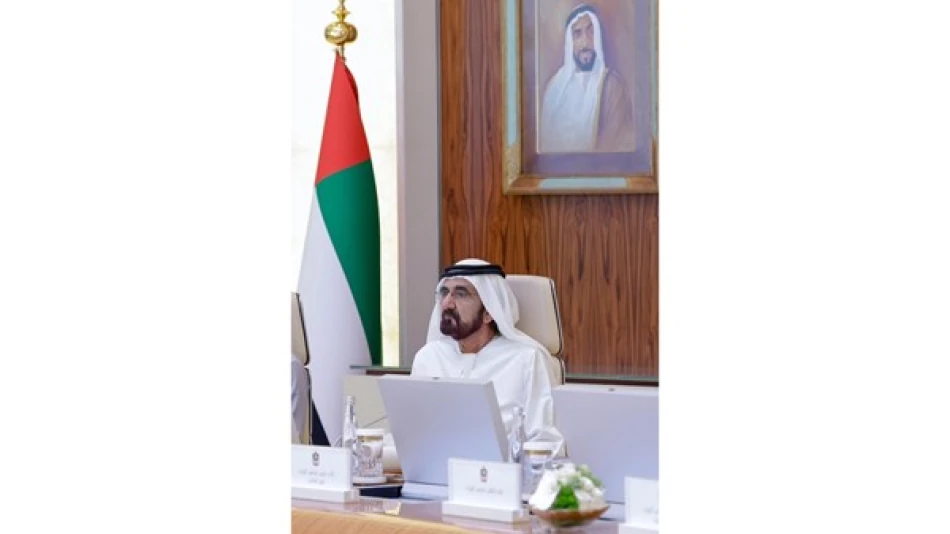
UAE Vice President Chairs First Cabinet Meeting at the Union House
UAE Launches $8 Billion Economic Cluster Strategy to Challenge Global Manufacturing Hubs
The UAE has unveiled an ambitious national policy to create specialized economic clusters that could add over $8 billion annually to its GDP, positioning the Emirates to compete directly with established manufacturing and service hubs like Singapore and South Korea. The initiative, announced during the first Cabinet meeting of the new government season, represents a strategic shift toward industry consolidation and export-oriented growth.
Economic Clusters: The New Growth Engine
Sheikh Mohammed bin Rashid Al Maktoum, UAE Vice President and Prime Minister, revealed that the National Policy for Economic Clusters will group similar industries and services across all seven emirates, leveraging each region's unique advantages. The policy aims to enhance these sectors' capabilities and facilitate their access to global markets.
The 30 billion dirham ($8.17 billion) annual GDP boost represents approximately 2% of the UAE's current economic output, a significant contribution that could accelerate the country's diversification away from oil dependency. This cluster approach mirrors successful models in countries like Germany's industrial districts and Taiwan's technology parks, which have proven effective in creating competitive advantages through geographic concentration and knowledge spillovers.
Strategic Timing Amid Global Supply Chain Shifts
The announcement comes as global supply chains undergo major restructuring following the pandemic and geopolitical tensions. Companies worldwide are seeking alternative manufacturing and service hubs, creating opportunities for countries like the UAE to position themselves as reliable partners. The Emirates' strategic location between East and West, combined with world-class infrastructure, makes it an attractive option for businesses looking to diversify their operations.
Healthcare Innovation Takes Center Stage
The Cabinet also established the UAE Council for Integrative Medicine, led by Sheikha Salama bint Tahnoun bin Mohammed Al Nahyan. This council will bridge modern and traditional medicine practices, focusing on holistic approaches that address physical, mental, and psychological health.
This move reflects a growing global trend toward integrative healthcare, particularly in developed nations where patients increasingly seek alternatives to purely pharmaceutical approaches. Countries like Switzerland and Germany have successfully integrated traditional and modern medicine, creating new revenue streams in medical tourism and pharmaceutical research.
Genomics Program Expands Rapidly
The UAE Genome Council reported significant progress with over 750,000 participants in the National Genome Program and more than 8,500 trainees. The successful launch of pre-marital medical screening demonstrates the country's commitment to preventive healthcare, potentially reducing long-term healthcare costs while improving population health outcomes.
Environmental Commitments Signal Economic Opportunities
The Cabinet approved an updated national plan to reduce aviation sector emissions, aligning with global environmental commitments that could create new business opportunities. As the aviation industry faces increasing pressure to decarbonize, the UAE's position as a major aviation hub gives it influence in shaping industry standards.
The focus on air quality and environmental sustainability also supports the UAE's growing clean technology sector, which has attracted billions in investment as the country positions itself as a leader in renewable energy and sustainable development in the Middle East.
Digital Economy and International Engagement
The restructuring of the UAE Digital Economy Council and Entrepreneurship Council, alongside approval for 85 international agreements and 12 international events, demonstrates the country's systematic approach to economic diplomacy. This level of international engagement creates multiple touchpoints for business development and knowledge transfer.
For investors and businesses, these developments signal the UAE's continued commitment to economic diversification and innovation. The economic cluster policy, in particular, offers opportunities for companies to benefit from concentrated expertise, shared infrastructure, and coordinated export strategies. As global competition for foreign investment intensifies, the UAE's comprehensive approach to economic development strengthens its position as a preferred destination for international businesses seeking growth in emerging markets.
Most Viewed News

 Layla Al Mansoori
Layla Al Mansoori






